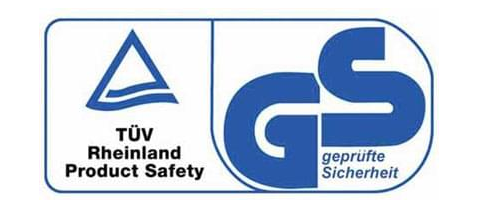GS Mark Certification
Introduction
1. GS certification mark:

2. Introduction to GS certification
1. GS mark is a safety certification mark issued by TUV, VDE and other institutions authorized by the German Ministry of Labor. The GS mark is a safety mark accepted by European customers. Generally, GS certified products are sold at higher unit prices and are more popular.
Others
1. GS certification process
1) First meeting: Through the first meeting, the testing agency or agency will explain the specific certification procedures and related standards to the applicant’s product engineer, and provide the required document forms.
2) Application: The applicant submits the documents that meet the requirements. For electrical products, it is necessary to submit the product assembly drawing, electrical schematic diagram, material list, product use or installation instructions, and differences between series models.
3) Technical meeting: After the testing agency has checked the applicant’s documents, it will arrange a technical meeting with the applicant’s technical staff.
4) Sample test: The test will be carried out in accordance with the applicable standards, and can be carried out in the manufacturer's laboratory or any laboratory of the inspection agency located in various countries.
5) Factory inspection: GS certification requires safety-related procedural inspections on production sites.
6) Issue GS certificate.
2. GS certification cycle
Generally speaking, the length of time depends on whether the product needs to be modified or the speed at which the manufacturer submits the required product documentation. In general, the time required is generally about 6 to 8 weeks.
Required Documents for GS certification
GS certification requirements for products and documents:
-The product must pass the European safety standard type test.
-The product structure must meet the standard requirements.
-The instructions (German, English) must meet the standards.
-English documents such as "Structural Drawings", "Circuit Diagrams", and "Parts List" prepared as required, and product testing will be carried out according to the parameters provided by these documents.
[GS certification process]
1) First meeting: After the first meeting, the testing agency or agency will explain the specific certification procedures and related standards to the applicant’s product engineer, and provide the required document forms.
2) Application: The applicant submits the documents that meet the requirements. For electrical products, it is necessary to submit the product assembly drawing, electrical schematic diagram, material list, product usage or use and installation instructions, and differences between series models.
3) Technical meeting: After the testing agency has checked the applicant's documents, it will arrange a technical meeting with the applicant's technical staff.
4) Sample test: The test will be carried out in accordance with the applicable standards, and can be carried out in the manufacturer's laboratory or any laboratory of the inspection agency located in various countries.
5) Factory inspection: GS certification requires safety-related procedural inspections on production sites.
6) Issue GS certificate.
[GS certification cycle and certification costs]
Generally speaking, the length of time depends on whether the product needs to be modified or the speed at which the manufacturer submits the required product documentation. In general, the time required is generally about 6 to 8 weeks.
The cost includes a one-time certificate issuance fee, factory inspection fee and annual certificate fee. The specific number will be determined according to the category of the product and the required tests. The certification body will provide you with a price reference after receiving the required documents submitted by the applicant. The market policy and credibility of each certification body are different, and the price will vary.
Why Choose Us?
HTW Lab, accredited by CNAS, CMA, CNCA & A2LA, consistently operates competently and generates accurate and valid results in accordance with ISO/IEC 17025. We are also IECEE CB Scheme Test Laboratory (CBTL). Thus, testing reports from HTW Lab can be accepted between countries.
Your Benefits at a Glance:
1.20 Years of experience
HTW has extensive experience in all types of devices and regulatory requirements across markets.
2.Provide free modification service
Together with our wealth of knowledge in complex regulations globally, HTW provides a complete suite of testing solutions according to your needs including free modification service.
3.Save time to global markets
With over 7,000 square meters of labs, HTW offers the best testing cycles and you don't have to wait in line, HTW offers 1-on-1 service.With our in-depth insight of global product quality and regulatory requirements, HTW can optimize your costs and minimize your time to market.
4.Complete qualifications
ISO/IEC 17025 lab, accreditated by CNAS, CMA,A2LA,GLP.
5.Competitve price
Testing costs are lower than other labs.
We're Here for You
We're based in China but regularly work with clients globally. We will get back to you in 1 working day.
Email:
You can also contact us directly by email.
HTW Testing and Certification Solutions.
Product We Test
V/M | Safety | EMC | Wireless | Factory Audit |
V | Y | Y | N | Y |
1. Household appliances, such as refrigerators, washing machines, kitchen appliances, etc.
2. Household machinery.
3. Sports goods.
4. Electrical and electronic office equipment, such as copiers, fax machines, paper shredders, computers, printers, etc.
5. Industrial machinery, experimental measurement equipment.
6. Other safety-related products such as bicycles, helmets, ladders, furniture, etc.

